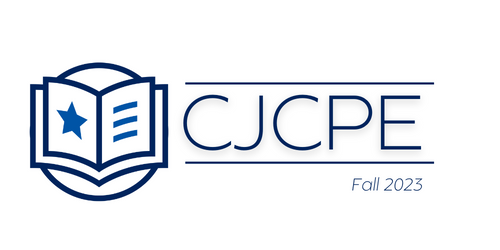Abstract
To develop an equitable, high-functioning healthcare system, all health professionals must have the ability to work collaboratively across professions. This must include an understanding of the healthcare system and the policies that contribute to that system. The study of the humanities contributes to the development of the skills needed to work effectively in healthcare and develop effective policies that meet the needs of humanity. Book club discussions that bring together students in the various health profession programs including nursing, pharmacy, medicine, dentistry, and others may provide an effective strategy to incorporate the humanities while improving interprofessional skills as well as skills in advocacy and policy development needed in the healthcare arena. The purpose of this project is to describe interprofessional students’ experiences and learning as participants in book club discussions focusing on the humanities at one Midwest health professions education institution. In total, 27 medical, dental, nursing, and allied health students participated in three separate book club discussions. Following the discussions, each student completed a survey about the experience and wrote a reflection addressing the learning outcomes for the discussion. The survey results indicated that students viewed the interprofessional book club discussions positively. The written reflections were reviewed using thematic analysis, identifying common themes. The reflections supported advocacy and policy development as the foci for these discussions. Additionally, five themes emerged including: quality patient care, communication, interprofessional collaboration, evidence-based practice, and leadership. Students were able to draw clear connections between the content of the books and interprofessional practice, policy development and advocacy within healthcare demonstrating the relevance of incorporating humanities into health professions curricula through book club discussions. The themes that emerged relate well to the learning outcomes for the activity and the Core Competencies for Interprofessional Collaborative Practice from the Interprofessional Education Collaborative. This project supports the use of book club discussions as an educational strategy to incorporate the health humanities in interprofessional education and achieve interprofessional competency and skills in advocacy and policy development.
References
Interprofessional Education Collaborative (IPEC). Core competencies for interprofessional collaborative practice: 2016 update, 2016. Interprofessional Education Collaborative.
American Association of Colleges of Nursing. The Essentials: Core Competencies for Professional Nursing Education, 2021. American Association of Colleges of Nursing.
Davidson C, Goldberg D. A Manifesto for the Humanities in a Technological Age. The Chronicle Review, 2004,50(23), b7.
Clarke B, Ghiara V, Russo F. Time to care: Why the humanities and the social sciences belong in the science of health. BMJ Open, 2019 Aug 27;9(8):e030286. doi: 10.1136/bmjopen-2019-030286.
National Academies of Sciences, Engineering, and Medicine. The Integration of the Humanities and Arts with Sciences, Engineering, and Medicine in Higher Education: Branches from the Same Tree, 2018; The National Academies Press. https://doi.org/10.17226/24988
Harvey P, Chiavaroli N, Day G. Arts and humanities in health professional education. Clinical Ed for the Health Prof, 2020:1-18. doi: 10.1007/978-981-13-6106-7_49-1
Viney W, Callard F, & Woods A. Critical medical humanities: Embracing entanglement, taking risks. Med Humanit. 2015;41(1):2-7. doi: 10.1136/medhum-2015-010692
Olsen LD, Gebremariam H. Disciplining empathy: Differences in empathy with U.S. medical students by college major. Health, 2022 Jul;26(4):475-494. doi: 10.1177/1363459320967055.
Bleakley A. Invoking the medical humanities to develop a #MedicineWeCanTrust. Acad Med, 2019 Oct;94(10):1422-1424. doi: 10.1097/ACM.0000000000002870.
Berry S, Jones T, Lamb E. Editors’ introduction: Health humanities: The future of pre-health education is here. J Med Humanit, 2017 Dec;38(4):353-360. doi: 10.1007/s10912-017-9466-0.
Costa M, Kangasjarvi E, Charise A. Beyond empathy: A qualitative exploration of arts and humanities in pre-professional (baccalaureate) health education. Adv Health Sci Educ Theory Pract, 2020 Dec;25(5):1203-1226. doi: 10.1007/s10459-020-09964-z.
Lee J, Lee J, Jung I. An integrated humanities–social sciences course in health sciences education: Its proposed design, effectiveness and associated factors. BMC Med Educ, 2020 Apr 19;20(1):117. doi: 10.1186/s12909-020-02022-7.
Ilcewicz HN, Poirier TI, Pailden J. Use of mixed-methods approach to assess the impact of a pre-professional health humanities honors course on developing interpersonal skills. Curr Pharm Teach Learn, 2018 Nov;10(11):1456-1465. doi: 10.1016/j.cptl.2018.08.010.
Puspita N, Hasyim UA, Suhono S. Book club discussion: An extensive reading program in writing class. Attractive, 2021;3(2):91-101. doi: http://dx.doi.org/10.51278/aj.v3i2.238.
Ney DB, Ankam N, Wilson, A, Spandorfer, J. The implementation of a required book club for medical students and faculty, Medical Education Online, 2023, 28:1, doi: 10.1080/10872981.2023.2173045.
Haley J, Carlson McCall R, Zomorodi M, de Saxe Zerdan L, Moreton B, Richardson L. Interprofessional collaboration between health sciences librarians and health professions faculty to implement a book club discussion for incoming students. J Med Libr Assoc, 2019 Jul;107(3):403-410. doi: 10.5195/jmla.2019.563.
Jordan J, Bavolek RA, Dyne PL, Richard CE, Villa, S, Wheaton, N. A virtual book club for professional development in emergency medicine. West J Emerg Med, 2020 Dec 14;22(1):108-114. doi: 10.5811/westjem.2020.11.49066.
Jensen D, Stark RK. Utilizing an interprofessional book club focused on aging and dying to enhance IPE opportunities for allied health students, Journal of Interprofessional Education & Practice, 2022, Feb 27. doi: https://doi.org/10.1016/j.xjep.2022.100505
Braun V, Clarke V. Thematic analysis. In H. Cooper, PM, Camic, DL, Long AT, Panter, D, Rindskopf, Sher, KJ (Eds.), APA handbook of research methods in psychology, Vol. 2. Research designs: Quantitative, qualitative, neuropsychological, and biological, 2012: 57–71. American Psychological Association. https://doi.org/10.1037/13620-004.

